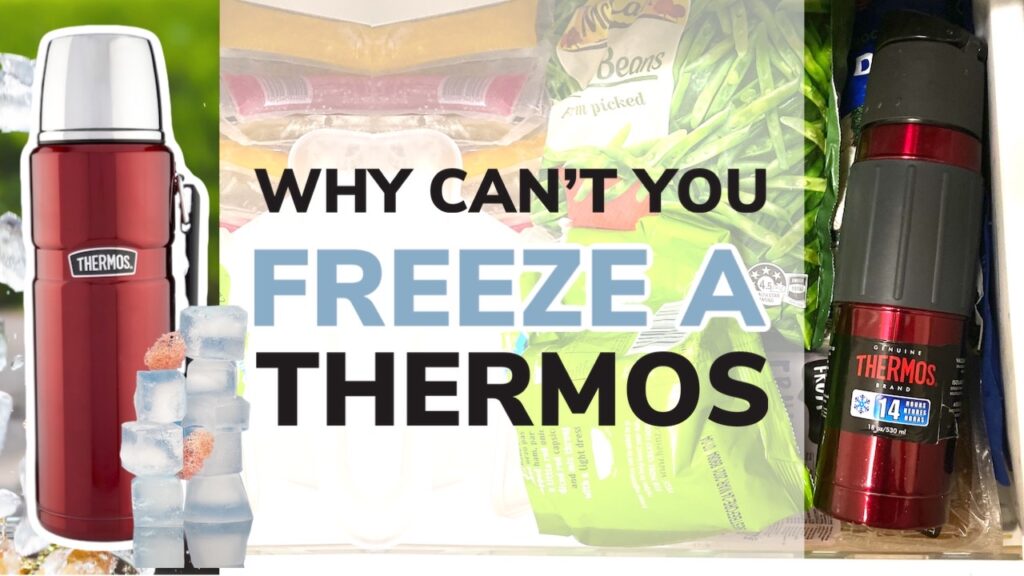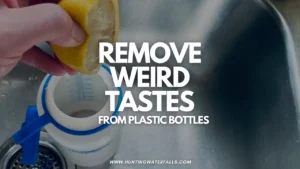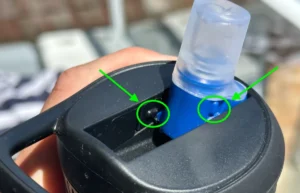Thermos flasks are designed to keep food or drinks iced cold or hot for hours at a time. So what's the go with putting your thermos in the freezer?
Why can't you freeze a thermos? And why do Thermos and other brands advise against putting your insulated containers, bottles and cups in the freezer? What actually happens if you put a thermos in the freezer?
My kids absolutely love using the Thermos bottle we have for school and I thought it would be a good idea to put it in the freezer to pre-chill it, or partially freeze some ice in it so they have cold water all day long. This would save me some preparation in the morning when we are trying to get ready for school.
So I wanted to check and see if I could just freeze the thermos the night before and if not what are the potential issues? So I did some research and here's what I found:
The reason you can't freeze a Thermos is that liquid expands as it cools. This expansion can bend the stainless steel Thermoses, or shatter glass thermoses breaking the insulation in both. If this happens your Thermos will no longer insulate properly.
It's definitely possible that you could freeze your thermos without any issues but there is always that risk of potentially damaging it. If you do break your thermos because you freeze to it's unlikely that this would be covered under warranty.
See the latest price of Thermos Flasks at Amazon
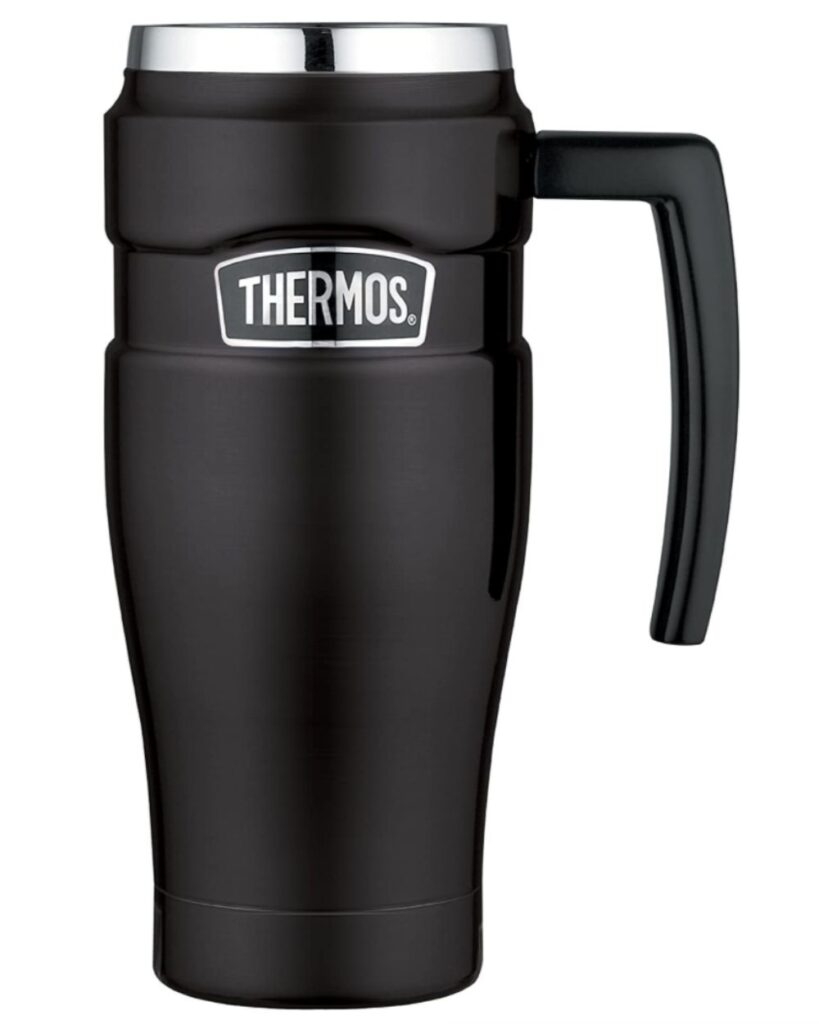
Does Thermos Say Not To Freeze Your Bottle?
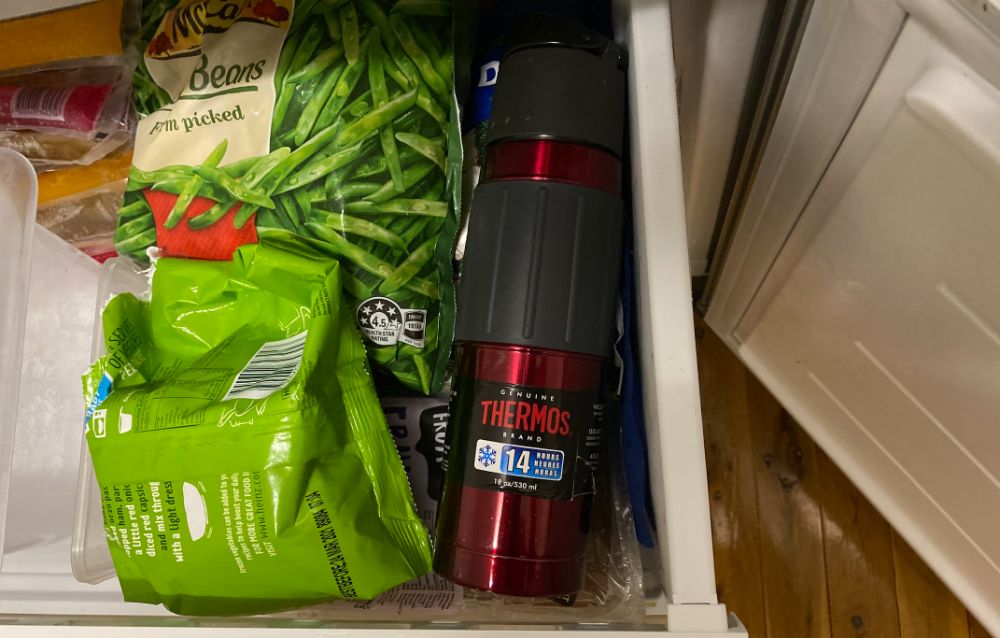
I couldn't find anywhere on Thermos' website that you shouldn't freeze the flask. I only know that this is generally not advised due to the fact that you can't freeze Yeti cups and you can't freeze Hydro Flasks.
Their product care page for both the stainless steel vacuum insulated as well as the glass vacuum insulated doesn't mention not freezing it.
But other companies who make similar vacuum insulated products do mention it. On Hydro Flask's product care page they say:
You Shouldn't:
Put your Hydro Flask in the freezer: Due to the double wall vacuum insulation, the water inside will be protected from the temperature inside the freezer and won’t freeze. If you want ice cold water, put some ice cubes inside your flask and notice how long it takes them to melt!
The following statement from competing brand Contigo actually gives a reason why you shouldn't freeze the vacuum insulated products.
On this article about the topic they state:
When liquids freeze, they expand and take up more space. As the liquid freezes and expands, it can cause your water bottle or travel mug to become deformed and misshapen.
Even worse, the expanding liquid might break the welds and seals holding your water bottle together. If you place a stainless steel water bottle in a freezer, you might unintentionally and up damaging the vacuum seal, causing it to lose its insulating properties and not keep your water cold for as long. Ironic, right?
What Do Other People Say About Freezing Your Thermos?
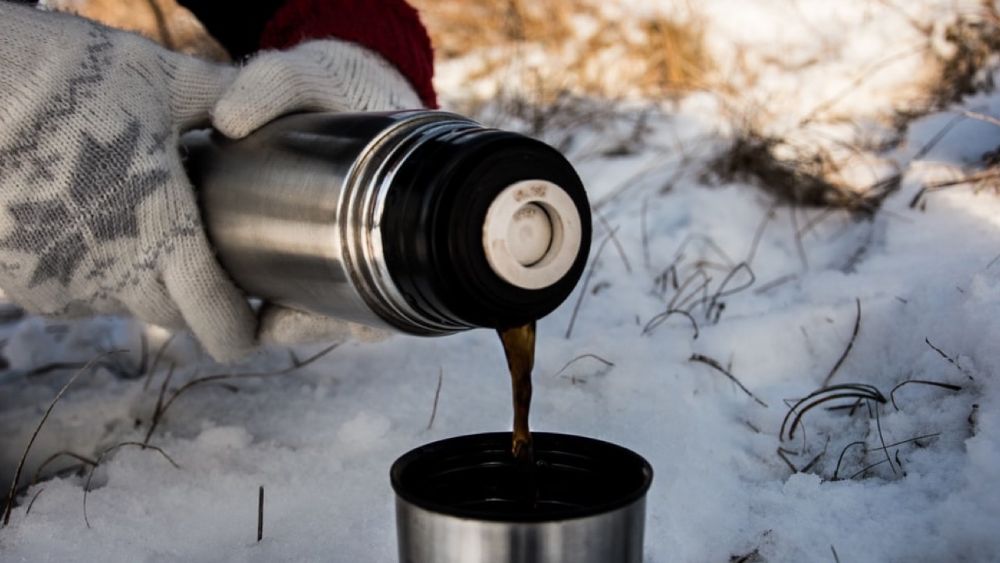
Because Thermos don't have any information at all about freezing their vacuum insulated flasks and cups I wanted to do some more research and see what other people on the internet were saying.
I found this Quora question where someone asked if it was safe to put an open empty thermos in the freezer to make things last longer in it.
Someone wrote in response:
I don’t think it is either safe or a good idea. First, there is no reason to do it. It will not make anything colder or longer lasting. Second, it’s not safe, in all likelihood. If it has water in it, for instance, it most likely will break the glass vacuum insert as the water freezes.
This person brings up 2 good points:
1. There Is No Point Freezing an Empty Thermos
A lot of people think putting an empty Thermos in the freezer will pre-chill it and cause it to make whatever you put in there colder than it would otherwise be.
But the fact is Thermoses keep drinks cold because they have a vacuum which heat struggles to pass through.
You can't exactly heat up or cool down the vacuum because it has little-no particles in it.
So you're really only cooling down the thin layer of stainless steel or glass which has little to no effect on whatever drink you put in your Thermos.
One of the reasons ice melts so quickly in a cooler like Yeti is because the insulation can actually retain heat and cause your ice to melt. So pre-chilling it is important to strip the heat from the insulation.
But a Thermos works differently to this and pre-chilling it only has a tiny effect on it's overall ice retention.
2. Freezing a Thermos With a Drink In It Is a Bad Idea
As they stated in answer to that Quora question as the water freezes and turns into ice it's going to expand.
This will cause it to break any glass thermos (which will then implode and leave tiny shards of glass everywhere.)
Or it's going to deform a stainless steel thermos and maybe break the vacuum seal. The flask will still work to hold water (no shards of glass) but it won't insulate very well anymore.
While this isn't definitely going to happen with the stainless steel bottles, it is a posibility.
There isn't much online about freezing a Thermos. From what I understand it'll likely be fine to freeze it empty but it'll have little to no impact on keeping things cold and freezing it with a drink in it isn't advised.
I did find this amazon post where a lady named Christine said that she put her insulated Yeti in the freezer and the metal bottom part cracked in a few places.
I am guessing she is talking about the protective metal plate that goes over the bottom of Yeti cups to protect the vacuum seal. Thermos also has then protective plates.
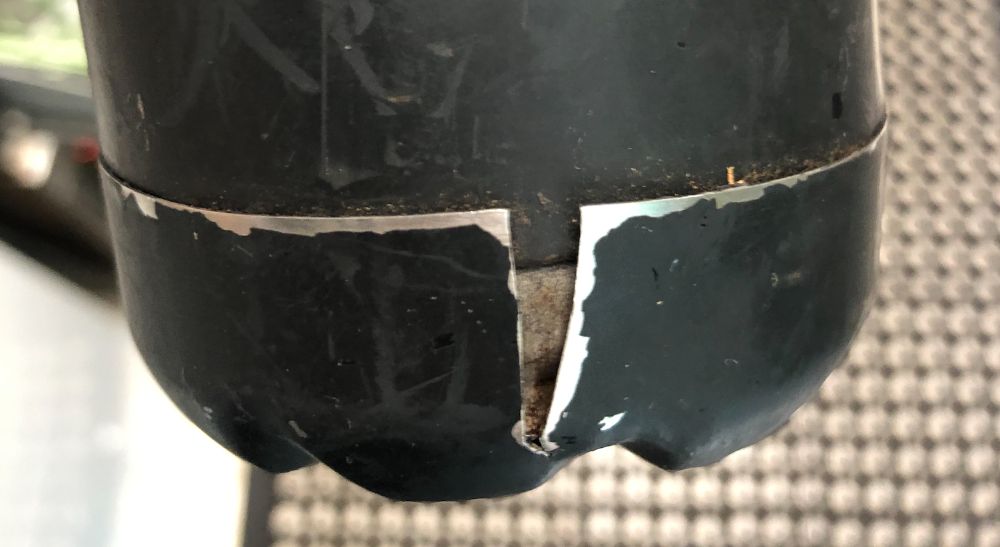
While this person's Yeti may still work fine I see this as proof that freezing a Thermos, or similar brand bottles, cup or flask, does that the potential to break it.
Why Would You Want To Freeze a Thermos?
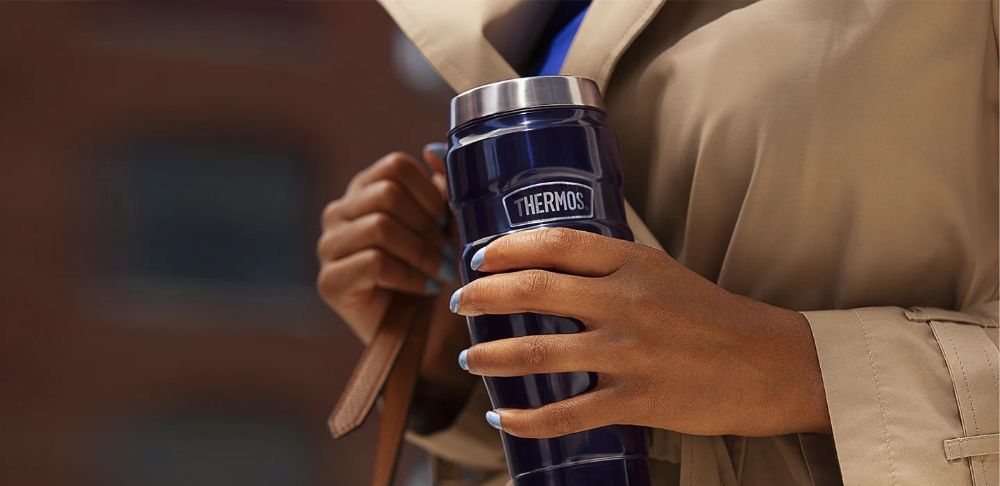
Maybe you want to freeze a drink in your thermos or partially freeze some water so you've got ice for the next day.
But most people seem want to freeze the thermos to pre-chill it so when you pour your drink into it it stays cold or longer. However does this actually work?
.Pre-chilling the inside of your thermos does give you a tiny improvement in ice retention but it's hardly worth doing. The vacuum between the inner and outer wall of the thermos isn't affected really at all by pre-chilling and so pre-chilling won't really keep drinks colder longer.
All you're really doing is pre-chilling the glass or the stainless steel.
Can You Freeze an Empty Thermos?
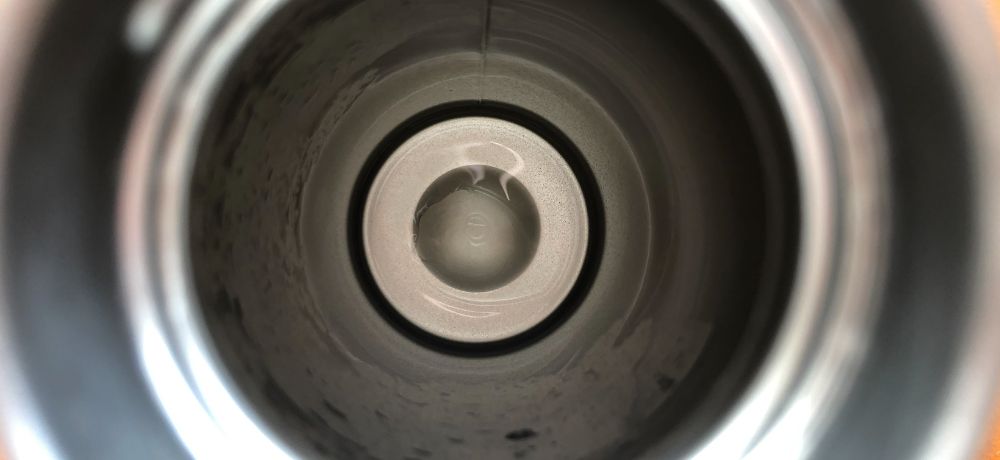
Is it safe to freeze an empty thermos flask without anything in it?
If you're just trying to pre-chill your thermos and there's no liquid in there then it is actually safe to put it in the freezer.
In theory the only thing that can really break your thermos in the freezer is liquid expanding as it turns into ice. However, if your thermos is empty then this cannot happen.
Thermoses are designed to handle extremely cold temperatures and they can keep water ice cold all day long. So the coldness of a freezer isn't really a problem.
Thermoses are made from either glass or stainless steel. The stainless steel is extremely difficult to break however the glass can break with sudden changes in temperature so just be careful if you're putting it in the freezer.
You may want to put your thermos in the freezer to keep something already frozen frozen. Maybe you have ice cubes or maybe you want to store some ice cream.
Because these items are already frozen and on in liquid form they aren't going to expand in the freezer and so they shouldn't pose any risk to your thermos.
I could also see someone placing something already frozen (like ice cubes or ice cream) in their Hydro Flask and placing this in the freezer either with the lid on or off.

Because the items are already frozen they don't have any more expanding to do and so they shouldn't put any pressure on your Hydro Flask and shouldn't be able to damage it.
In fact using a thermos can be a great way to keep ice cream frozen without a freezer.
Will Freezing Your Thermos Void Your Warranty?
Thermos products comes with a 5 year warranty for stainless steel vacuum wear and a 1 year warranty for glass vacuum ware.
However, this protects you from manufacturing defects and doesn't protect you if you're the one who breaks your thermos.
While they don't talk specifically about freezing your thermos they do state on their warranty page:
IN NO EVENT WILL THERMOS BE LIABLE FOR INCIDENTAL, CONSEQUENTIAL OR SPECIAL DAMAGES.
So it seems pretty clear that if you break your thermos because you put it in the freezer with liquid in it then it is highly unlikely to be covered under warranty and you'll need to buy a new one.
See the latest price of Thermos Flasks at Amazon


